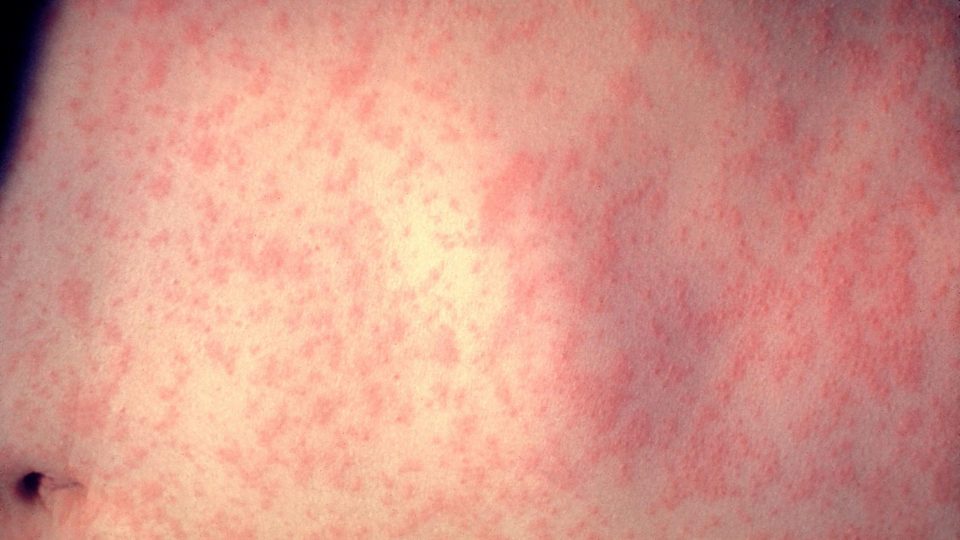Indonesia’s battle to stem a deadly measles outbreak striking malnourished children in Papua is doomed to be repeated unless the government helps lift the isolated region out of grinding poverty, observers said.
Some 800 children have fallen ill and as many as 100 others, mostly toddlers, are feared to have died in what Jakarta called an “extraordinary” outbreak that was first made public this month.
AFP reporters obtained rare access to an overwhelmed hospital in Agats, one of the worst-affected communities, witnessed rail-thin children with exposed rib cages lying on rickety beds or wandering foul-smelling hallways.
One malnourished girl, hooked up to an IV drip, was seen lying on the floor of an under equipped hospital.
The disease has proven especially deadly here as malnutrition makes children more susceptible, weakening their immune systems.
Indonesian President Joko Widodo has ordered military and medical teams to bring supplies to remote villages in the far-flung province.
Observers blame the crisis on a complex mix of government inaction, lack of jobs, logistical hurdles in reaching remote communities and resettlement efforts that pose a serious threat to traditional hunting-based lifestyles.
A low-level separatist insurgency is also simmering in the region, fueled by resentment over poor conditions and a fight for a bigger share of Papua’s rich natural resources.
Many Papuans live a semi-nomadic life in hard-to-reach areas of the jungle with almost no proper medical care, schools or other services, including access to clean water.
In Ayam village, a ten-hour boat ride from the nearest major city, a tiny clinic lacked almost everything — including doctors — as its few nurses struggled to treat more than two dozen measles cases.
Some locals worry what will happen when the medics leave.
“What we really need is medicine and food so our children here can be healthy again,” said 28-year-old father Yunus Komenemar, whose one-year-old son has measles.
“The government is paying more attention, aid is coming in and there are (positive) changes, but we want it to last.”
Some 12,000 children with no symptoms have been treated, including with vaccinations, according to the health ministry, but in the past many Papuans have refused the shots that are seen as key to preventing outbreaks.
‘Isolation’
Indonesia has opened new district governments across Papua and tried to settle locals into permanent villages, but many of the new offices are not equipped to handle the huge task ahead.
And resettlement forces locals to adapt to a new lifestyle including adjusting to imported foods that are often already expired by the time they arrive on the island shared with Papua New Guinea, observers said.
Complicating matters, many Papuans avoid the province’s few medical clinics because they do not think they need treatment, while some avoid larger communities for fear of coming into contact with Indonesia’s military, which has been blamed for human rights abuses.
Natalius Pigai, a former senior official at Indonesia’s government-backed National Human Rights Commission, warned that the future of Papua and its people was at stake.
“To stop (crises) from happening again in the future, we need to stop Papua’s isolation,” he said.
While some new plantations offer hope for the local economy, most workers are not native Papuans, experts said.
Jakarta took control of western Papua after hundreds of years of Dutch colonial rule and a UN-backed self-determination referendum in 1969 that was regarded by many historians as a sham, leading to long-simmering tensions.
When Widodo took office in 2014, he vowed to speed up infrastructure development and services, bolstering hopes for the region, observers said.
“What the government is saying is what we think is important to do (for Papua) is in fact not being done,” said Richard Chauvel, a Papua expert at the University of Melbourne’s Asia Institute.
“The question is whether these newly established (district) governments have the human resources, experience and skills to provide these sorts of services,” he added.
‘Lack of leadership’
Much of the blame lies with regional politicians and their “lack of leadership”, according to Freddy Numberi, a former governor of Papua.
The poverty-stricken region gets ample central government funding but much of it does not get used for improving health and education, among other services, owing to corruption and wasteful spending, he added.
“You could say it’s a paradox actually — they have everything but they blame the central government,” Numberi said.
Widodo lifted a travel ban on foreign journalists visiting Papua in 2015.
But unofficial restrictions on access have allowed Indonesia to govern a region wracked by regular public health crises without accountability, said Andreas Harsono, an Indonesia-based campaigner for Human Rights Watch.
“As measles is easily prevented with a safe and inexpensive vaccine, these deaths should never have happened,” he said, adding that Papua has Indonesia’s lowest life expectancy and highest infant, child and maternal mortality rates.
“I hope this crisis will help some people here — at least those in power -— to change their minds, but if they choose business as usual another crisis will appear next year as well.”




